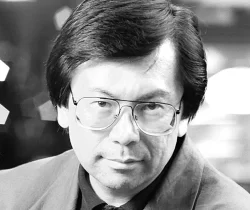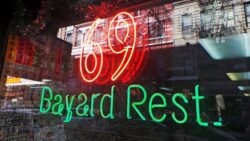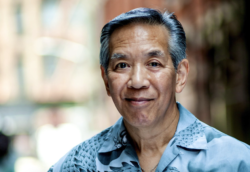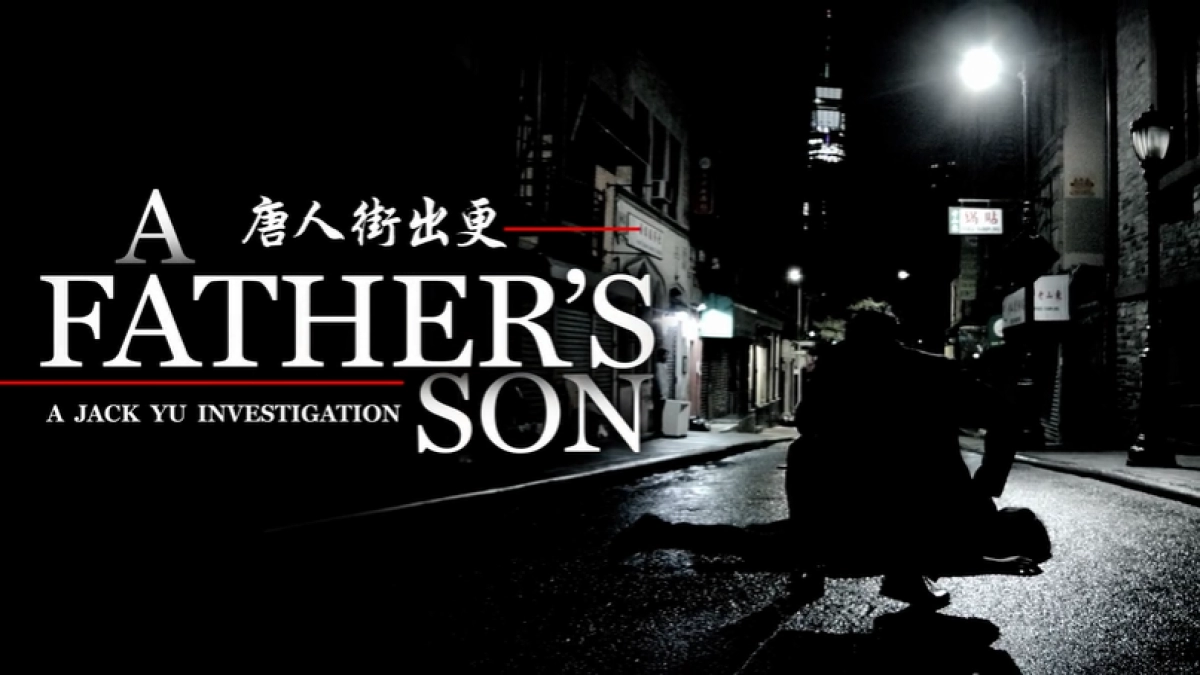It’s a last glimpse at some familiar faces
“A Father’s Son” is Chinatown’s breathing testament to the pandemic. Patrick Xi Hao Chen began filming in 2019. Sustained by community funds, he hurtled through film shoots like he was on a ticking clock.
“It’s like I felt the pandemic coming,” Chen said. “Like ‘We have to get this done now, or else.’”
The final product–a short Chen hopes to turn into the pilot of a TV series – has unintentionally captured the major upheavals faced by New York City Chinatown and the Asian American community through its production. “A Father’s Son” is adapted from the first two books in Henry Chang’s “Detective Jack Yu” series about the investigations of the only Chinese cop in an all-white precinct. Chang based the storyline on the poverty, gang violence and police inaction that he witnessed growing up in Chinatown.
“I wanted something like ‘Boyz n the Hood’ for the Black community,” Chen said. “No one expects Asian Americans to talk about police brutality.”
Like the books, the film is a Wong Kar Wai-esque ’90s-era noir – a stark contrast to glitzy media representation of Hollywood Asians today. Jack Yu is the only cop culturally fit to investigate the murder of a local Chinese American, but the Chinatown community he is familiar with refuses to collude with him. Chen realized while scripting that he did not want yet another Asian gangster film. There were plenty focused on violence. He instead centered the relationship between Jack and his father – a parallel to the relationship between a Chinese American cop and his distrusting community, and between minority cops in a blatantly racist precinct.
This adaptation is concurrently a present and posthumous tribute to the familiar faces of New York City’s Chinatown. It’s a star-studded cast for those in the know. The eponymous Jack Yu is played by Ronny Chieng of the Daily Show fame. His father is played by Perry Yung (Father Jun on Cinemax’s “The Warrior”) recounting Cantonese trauma to his son. TV Dad Tzi Ma reappears in all his emotional complexity as the father of a murder victim. “White Hollywood wouldn’t recognize them,” Chen said, “but Asian Americans will.”

The film is dedicated to Corky Lee. “Corky didn’t have kids, so he treated all of us young people like his kids.” (Image Credit: Jason Jem/Facebook)
Several Chinatown natives cameo as locals Jack Yu attempts to connect with as he struggles with his identity – including Chang’s longtime friends. This film is photographer Corky Lee’s last appearance in a narrative film before he passed away from COVID in 2021, and one of actor Geoff Lee’s last before he succumbed to cancer in February 2022.
“You learn to treasure them before they’re gone,” Chen said of these familiar faces.
Chen wanted to portray Chinatown before gentrification – a difficult task for a neighborhood whose every major block has been developed on since the ’90s. He chose the faces of Chinatown stores that have changed the least. Production designer Wing Lee covered up the rest.
As a result, Jack Yu investigates the murder in tight shots on Doyers Street – once known as the “Bloody Angle” where gangster murders made it the deadliest street in the United States, now a spot where tourists dine at Nom Wah Tea Parlor – whose black pavement was painted with a technicolor mural in 2018. He walks past Mosco Street’s red building, whose face would be painted with an anti-AAPI hate and land acknowledgement mural in 2021.

69 Bayard in Patrick Chen’s “The Last Tip” was one of the local eateries that stayed open past midnight. “You can’t do that anymore,” Chen said. These establishments now close early due to COVID restrictions and fear of hate crimes. (Image Credit: Winston Wanders)
When the 2020 lockdown hit, Chen and editor Xiaoya Ma were faced with the challenge of editing collaboratively through Zoom. Despite these unexpected obstacles, they made it through and captured the tenor of the times in their story. The question ensues: After more than a decade of publishing Jack Yu’s mysteries, why did man-about-town Henry Chang let Chen recreate his story?
Chen met Chang through local outings in Chinatown establishments.
“For years, a lot of people were whispering about [adapting ‘Detective Jack Yu’] to Henry,” Chen said. “That he took a chance on me and let me make this film … that’s huge.”

Chen first met Henry Chang in 69 Bayard, a Chinatown establishment he later featured in his short, “The Last Tip.”
“I bought a bottle of whiskey, and Henry was like, ‘I like this kid.’”
(Image Credit: Adam Lim/Navajo Productions)
“A Father’s Son” screened at the 45th Asian American International Film Festival.

